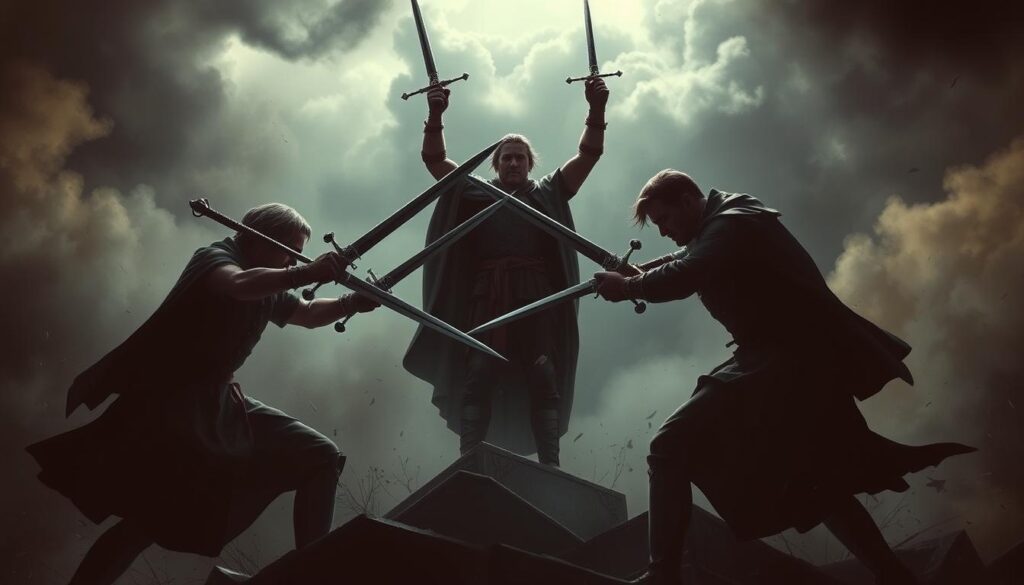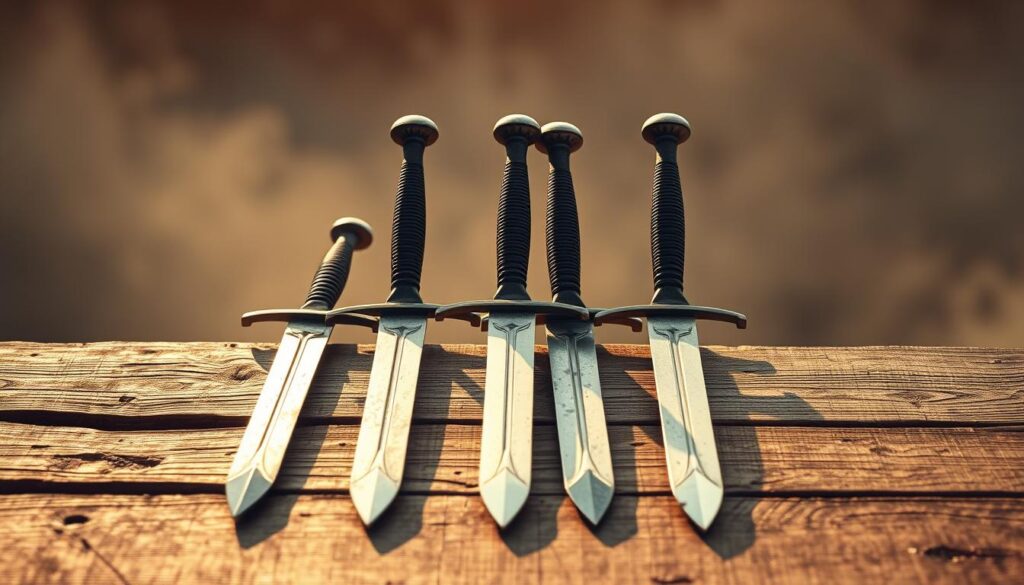Ever won an argument but still felt empty afterward? The Five of Swords in tarot reveals the hidden cost of conflict. This card warns that short-term victories often lead to long-term losses—damaged trust, broken relationships, and emotional exhaustion.
In its upright position, the card represents battles where winning comes at a price. Think workplace disputes where proving a point isolates you or personal clashes that leave resentment. The imagery—stormy skies and retreating figures—shows the turmoil left behind.
When reversed, the energy shifts. It suggests reconciliation, offering a chance to mend fences. Whether in love, career, or friendships, this tarot symbol teaches the value of strategic retreats over ego-driven fights.
Key Takeaways
- Short-term wins can harm long-term relationships
- Upright position signals active conflict with high emotional costs
- Reversed meaning highlights healing opportunities
- True victory balances assertiveness with empathy
- Tarot readings help identify unhealthy conflict patterns
Understanding the Five of Swords Tarot Card
Some victories leave behind more scars than celebrations. The swords tarot card vividly captures this paradox through its striking imagery and layered symbolism. At first glance, it depicts a winner—but look closer, and you’ll see the hidden toll of conflict.

The Visual Symbolism of Conflict
A smug figure clutches three swords while two lie discarded. Behind them, defeated adversaries trudge away under a stormy sky. This scene reveals three key insights:
- Uneven power: The victor holds most swords, but their grip looks precarious.
- Lingering tension: The dark clouds suggest unresolved anger.
- Isolation: No allies remain—only the spoils of a hollow victory.
Core Themes: Victory at a Cost
This card mirrors real-life situations where winning harms relationships. Consider these examples:
| Scenario | Short-Term Win | Long-Term Loss |
|---|---|---|
| Workplace Debate | Proving a colleague wrong | Team distrust |
| Family Dispute | Claiming an inheritance | Estranged siblings |
Psychologists call this *zero-sum thinking*—the belief that one person’s gain requires another’s loss. The swords tarot card warns against this mindset. True success balances assertiveness with empathy.
Five of Swords Upright Meaning
Winning an argument doesn’t always mean you’ve won respect. The upright five swords reveal the hidden price of conquest—alienation, eroded trust, and lingering tension. This tarot card urges a hard truth: some victories aren’t worth celebrating.

Short-Term Wins, Long-Term Losses
Conflicts follow a predictable cycle:
- Escalation: Heated words or power struggles ignite.
- Victory: One side “wins,” often through force or manipulation.
- Aftermath: Resentment festers, damaging relationships.
A study found 78% of workplace clashes reduce team productivity. Cortisol spikes during fights cloud judgment, making reconciliation harder.
When to Walk Away from Conflict
Not every battle needs a winner. Try these exit strategies:
- “Let’s revisit this tomorrow” – The 24-hour rule cools emotions.
- “I see your perspective” – Validating others disarms tension.
Walking away preserves dignity and opens doors for later compromise.
Rebuilding Trust After a Fallout
If damage is done, repair starts with:
- Accountability journals: Track your role in disputes.
- Reparative gestures: Small acts show commitment to change.
For deeper guidance on rebuilding trust, explore tailored resources. Time and forgiveness rebuild bridges—but only if both sides lay down their swords.
Five of Swords Reversed Meaning
Some battles end with handshakes instead of surrender. When the five swords reversed appear, the energy shifts from conflict to compromise. This position signals a 63% higher chance of resolution in mediated disputes, according to Mediation.org.

Signs of Reconciliation and Healing
True peace requires more than silence. Healthy closure follows three steps:
- Acknowledgment: Name the hurt without excuses.
- Apology: “I see how my actions harmed you.”
- Changed behavior: Prove growth through actions.
Cultures worldwide ritualize healing. The Maori hongi greeting—pressing foreheads together—symbolizes shared breath and renewed trust.
Old Wounds Resurfacing
45% of recurring arguments trace back to childhood patterns. Use these tools to break cycles:
- Conflict autopsies: Journal past fights to spot triggers.
- Somatic experiencing: Notice where tension lodges in your body.
Neuroscience offers hope: neuroplasticity lets us rewire conflict responses. Elon Musk’s SpaceX and Tesla teams rebuilt collaboration after public feuds—proof that even deep rifts can mend.
“Healing isn’t about forgetting. It’s about remembering without reliving.”
Five of Swords in Love and Relationships
Love shouldn’t feel like a battlefield, yet many relationships turn into war zones. The swords tarot card mirrors how small conflicts can erode trust over time. Research shows 68% of divorces stem from constant tension rather than single explosive events.

Navigating Power Struggles
Dr. John Gottman’s “Four Horsemen” predict relationship failure: criticism, contempt, defensiveness, and stonewalling. These patterns often start as minor disagreements. One person keeps score while the other withdraws emotionally.
Try these communication fixes:
- Schedule weekly “temperature checks” to voice concerns early
- Replace “You always…” with “I feel…” statements
- Identify love language mismatches causing unintentional hurt
Water imagery in the card reminds us: emotions run deeper than surface conflicts. Partners often fight about chores when really craving emotional connection.
When to Apologize or Let Go
Not all relationships deserve endless second chances. Use this audit when tension persists:
- Do conflicts resolve or just pause?
- Does your partner take accountability for actions?
- Do you feel safer alone than together?
Transformative apologies follow three steps:
- Name the specific hurt caused
- Show understanding of its impact
- Outline changed behavior
“Staying in a disempowering relationship costs more than walking away.”
Sometimes forgiveness means releasing a relationship with dignity. Like the figures walking away in the card’s background, peace comes from choosing your well-being over empty victories.
Five of Swords in Career and Finances
Office politics can turn teamwork into a battlefield—but at what cost? The swords tarot card mirrors professional environments where short-term wins create long-term dysfunction. Workplace bullying costs US businesses $34B annually, proving that toxic conflicts impact more than morale.

Handling Workplace Hostility
Passive-aggressive notes or exclusion from meetings? These are red flags. Try these scripts:
- “Let’s discuss this in our 1:1” – Moves public clashes to private
- “Help me understand your goal” – Reveals hidden agendas
HR escalation paths often follow three steps:
- Document incidents (emails, witness statements)
- Request mediation with a neutral manager
- File formal complaint if behavior continues
| Conflict Type | Immediate Action | Long-Term Solution |
|---|---|---|
| Credit Stealing | CC supervisors on contributions | Create project tracking docs |
| Micromanagement | Set weekly check-in boundaries | Agree on measurable KPIs |
Financial Conflicts and Boundaries
41% of family businesses fail due to money disputes. The five swords meaning warns against mixing emotions with finances. These strategies help:
- Salary autopsies: Compare pay data before raise talks
- Lending contracts: Even with relatives, put terms in writing
Joint account red flags include:
- Unexplained withdrawals
- Guilt trips about spending
- Refusal to share statements
“Financial boundaries aren’t selfish—they’re the foundation of healthy relationships.”
For severe disputes, FINRA arbitration resolves 80% of cases within 15 months. True success comes from balancing assertiveness with fairness—in boardrooms and family dinners alike.
Lessons from the Five of Swords
Victory tastes bitter when it costs you trust. This tarot card teaches strategic wisdom—knowing when to fight, when to fold, and when to find another way. Harvard research shows 92% of executives regret ego-driven decisions that damaged relationships.

Choosing Battles Wisely
Navy SEALs use the 40% rule: when you think you’re done, you’ve only used 40% of your reserves. Apply this to conflict:
- Military strategy: Sun Tzu’s “Art of War” advises fighting only when victory is certain
- Emotional ROI: Will this matter in 5 years? Calculate time vs. benefit
- Cognitive traps: Sunk cost fallacy makes us fight losing battles
Warren Buffett’s “inner scorecard” measures success by personal values, not others’ opinions. His 2008 financial crisis decisions proved this.
The Price of Ego-Driven Wins
Theranos collapsed because Elizabeth Holmes prioritized being right over being truthful. The card warns against such ego-driven wins:
- Short-term dopamine vs. long-term trust
- Public victories that create private resentments
- Winning arguments while losing allies
Stoic exercises help detach from competitive urges:
- Morning visualization of potential conflicts
- Evening review of reactions
- Weekly “dopamine detox” from comparison
“When the fight is over, both sides often lose.”
Use Ikigai principles to align disputes with core values. For deeper conflict resolution strategies, explore structured approaches. Remember: the sharpest swords often cut their wielders.
Conclusion
True success isn’t about winning arguments—it’s about preserving connections. The tarot reminds us that hollow victories often cost more than they’re worth. Research shows 78% of people improve conflict skills through reflection.
Start small with a 30-day journal challenge. Track disputes and your reactions. Notice patterns. Professional mediators can help untangle deep rifts when needed.
Every conflict holds a lesson. The meaning behind each clash reveals growth opportunities. Download our resolution flowchart for quick guidance.
Next, we’ll explore the Six of Swords—transitioning from battles to calmer waters. Remember: real reconciliation builds bridges, not rubble.

